The Spark September 2010
Since the August issue of The Spark a second wave of activity has crossed the country’s major centres in opposition to the employment law changes. Ian Anderson, a Workers Party member in Wellington reports below on activities in the capital.
Over August, two major events were organised in Wellington against the government’s attacks on workers. There was a public meeting against anti-worker laws, and the Council of Trade Unions (CTU) Fairness at Work rally.
Organised by a group including Workers Party activists, unionists and others, Thursday’s “Anti-Worker Laws” public meeting was a success. Due to heavy promotion including posters, leaflets, a Facebook event and a press release, turnout was good with around 60 people showing up. The CTU refused to promote the event, although they did take the opportunity to put up posters promoting their rally on Sunday.
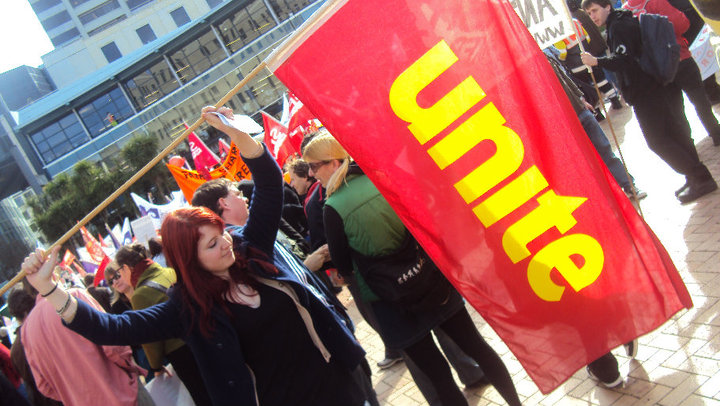
The event was held in St John’s on Willis. Starting at 7:30, Bill Logan of the International Bolshevik Tendency introduced the event with an overview of the new laws, introduced by Kate Wilkinson that very day, and their implications for the working class. Logan emphasised that this was not simply a “workplace” issue, but a class issue that affected families and children’s welfare. Continue reading “WELLINGTON WORKERS’ RIGHTS ACTION”
Three clear points about the employment law proposals
By Spark reporter
The Spark September 2010
Resistance is beginning. Unions, the left, and advanced layers of workers have started campaigning against the employment law reform proposals which were announced by the National government in mid- July 2010. National’s proposals, if implemented, will impact on sick leave and annual leave provisions, union access to work sites, the ability of individuals to challenge unfair dismissals, and the possibility of challenging unfair dismissals at all within the first 90-days of an individual s employment in a new job. As a package, these changes will further shift the balance of power to the employers by driving down collective bargaining power. Essentially, the rate of exploitation of our class will be increased so as to resolve the recession and recovery in favour of the employers.
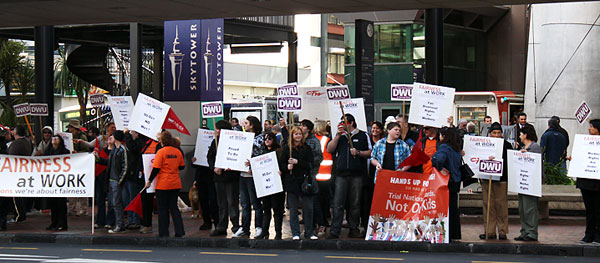
Continue reading “Three clear points about the employment law proposals”
STUDY: 1991 – the General Strike that Wasn't
Hosted by the Workers Party
Tuesday 10 August 2010 6pm-8pm Trades Hall 147 Great Nth Rd, Auckland
Reading: Peter Harris ctuand critical notes by Don Franks (WP) SOME RELECTIONS ON THE ECA INTRODUCTION
Tony Boraman: “The Myth of Passivity” http://libcom.org/files/The%20Myth%20of%20Passivity1.pdf
Oppose Strike Ballot Law
By Mike Kay
A Private Member’s Bill introduced by the National Party MP Tau Henare has been drawn from the ballot to be debated in Parliament. The Bill proposes to amend the Employment Relations Act as follows:
“A strike may not proceed under this Act, unless the question has been submitted to a secret ballot of those employees who are members of the union that would become parties to the strike if it proceeded.”
The Council of Trade Unions has announced its “support in principle” for the bill, “as it largely reflects current practice.”
The British experience may be of some use in analysing the effect of secret ballots. Over there, the law has required a secret ballot prior to strike action for nearly 30 years. I asked an official with the Postal section of the Communication Workers Union his opinion on the issue. This is his response:
What the secret ballot does is slow things down and makes it impossible to take spontaneous official action as a response to something immediate. What tends to happen then with our members is that they walk out unofficially. We are required as a Union to formally repudiate this action, which we always do but no-one has ever taken any notice of this.
The problem with strike ballots is the law that surrounds them and the way judges interpret this. Recently both we and Unite have run into trouble with the law concerning the information you have to provide to the employer on who is going on strike. This has become ever more onerous and now requires us not just to provide names but grades and details of workplace. With the best will in the world, this is impossible to get exactly right but judges are becoming less tolerant about errors in the face of injunctions from the employer.
In summary, therefore, it’s not the secret ballot itself that’s the major issue. Most members would probably resist any move to take it away now. It’s the rules surrounding its application and who is in charge of drawing them up. If it’s the Union itself, then no problem. If it’s the state or the courts then they will certainly be designed to make striking more difficult.
Unite union in Britain (not connected with Unite in NZ) is currently in dispute with British Airways over the employer’s plans to cut 1,700 jobs, impose a two-year wage freeze and get cabin crew working longer for less. When union members were balloted in December for a planned 12 day strike over Christmas, they supported strike action by 92% on an 80% turnout. BA then used the High Court to have the strike ruled illegal on the basis of a spurious technicality relating to the balloting process.
Unfortunately, not all workers have the same level of confidence as the posties, who often defy such decisions. The Unite action was suspended while a second strike ballot was taken. The new result was still impressive, although unsurprisingly the loss of momentum meant that the “yes” vote dropped by around 10%.
This brief look at the situation in Britain indicates that the CTU has been very complacent by endorsing Henare’s bill. Even if the bill does reflect the current status quo, it is far better that the law remains silent on the matter (as it is now), than give the employers an opportunity to challenge strike ballots through the courts.
The CTU also ignores an important point of working class principle; unions are workers organisations and should be run by workers from top to bottom. The form of union processes should be a democratic decision for union members, not National party hacks.
We need a movement willing and capable of launching a militant campaign for positive workers’ rights, including the unrestricted right to strike. The CTU has proven once again that it has no intention of leading such a movement.
Strike rights threatened
Mike Kay
A Private Member’s Bill introduced by the National Party MP Tau Henare has been drawn from the ballot to be debated in Parliament. The Bill proposes to amend the Employment Relations Act as follows:
“A strike may not proceed under this Act, unless the question has been submitted to a secret ballot of those employees who are members of the union that would become parties to the strike if it proceeded.”
The Council of Trade Unions has announced its “support in principle” for the bill, “as it largely reflects current practice.”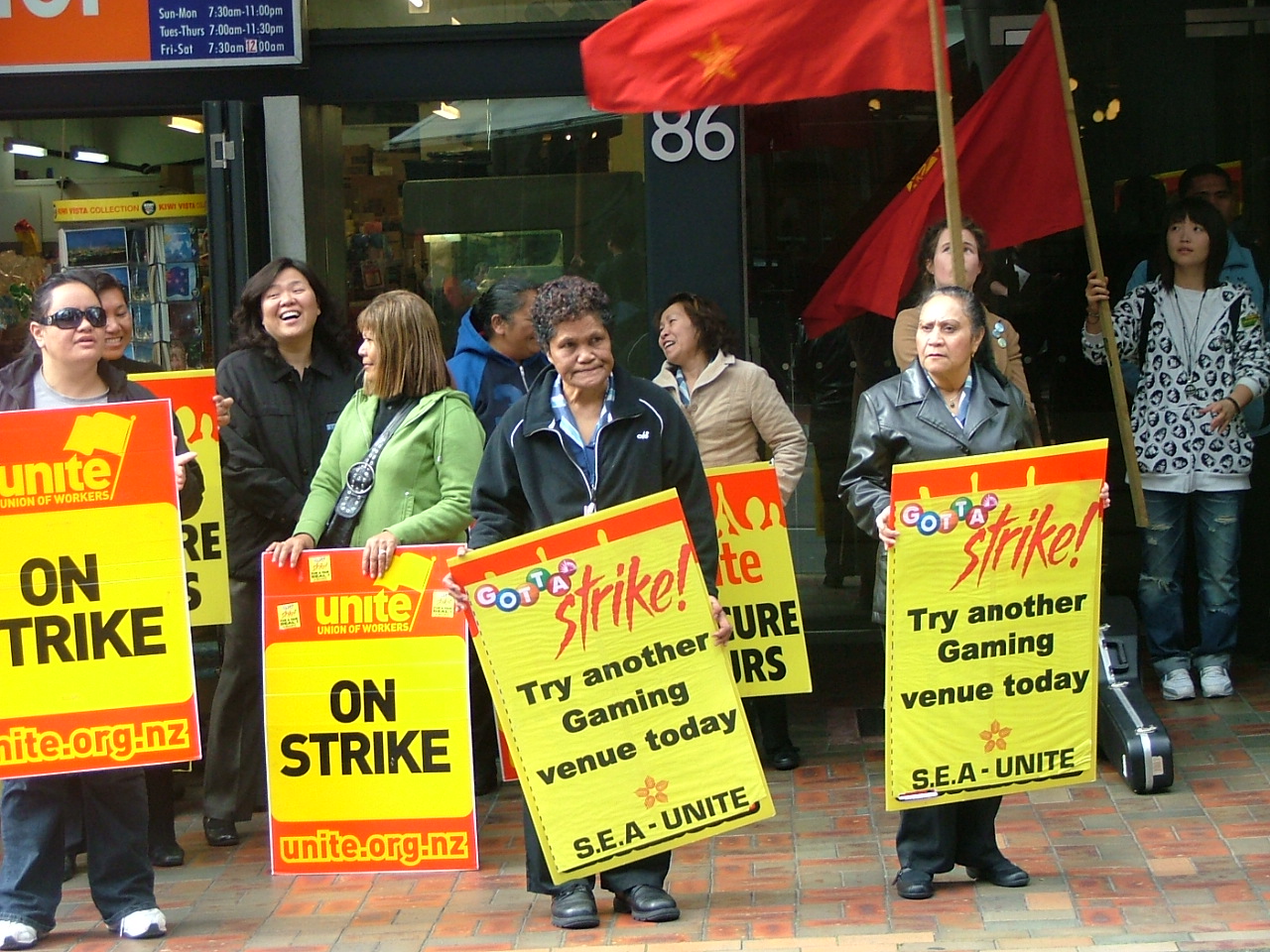
The British experience may be of some use in analysing the effect of secret ballots. Over there, the law has required a secret ballot prior to strike action for nearly 30 years. I asked an official with the Postal section of the Communication Workers Union his opinion on the issue. This is his response: Continue reading “Strike rights threatened”
Reclaiming the right to strike and how it’s essential for rebuilding workers’ power
The following article is a shortened and edited version of a Workers Party internal document by Jared Phillips printed in The Spark February 2010
Initially socialist organisations in New Zealand responded to the anti-strike laws contained in the Employment Contracts Act and Employment Relations Act with some vigor, including in The Spark. In response to increased strike restrictions put in place by the Labour-led Labour-Alliance coalition in 2000, the Socialist Workers Organisation conducted a campaign in some workplaces and in the public centered around a petition, which was significant as far as petition campaigns extend.
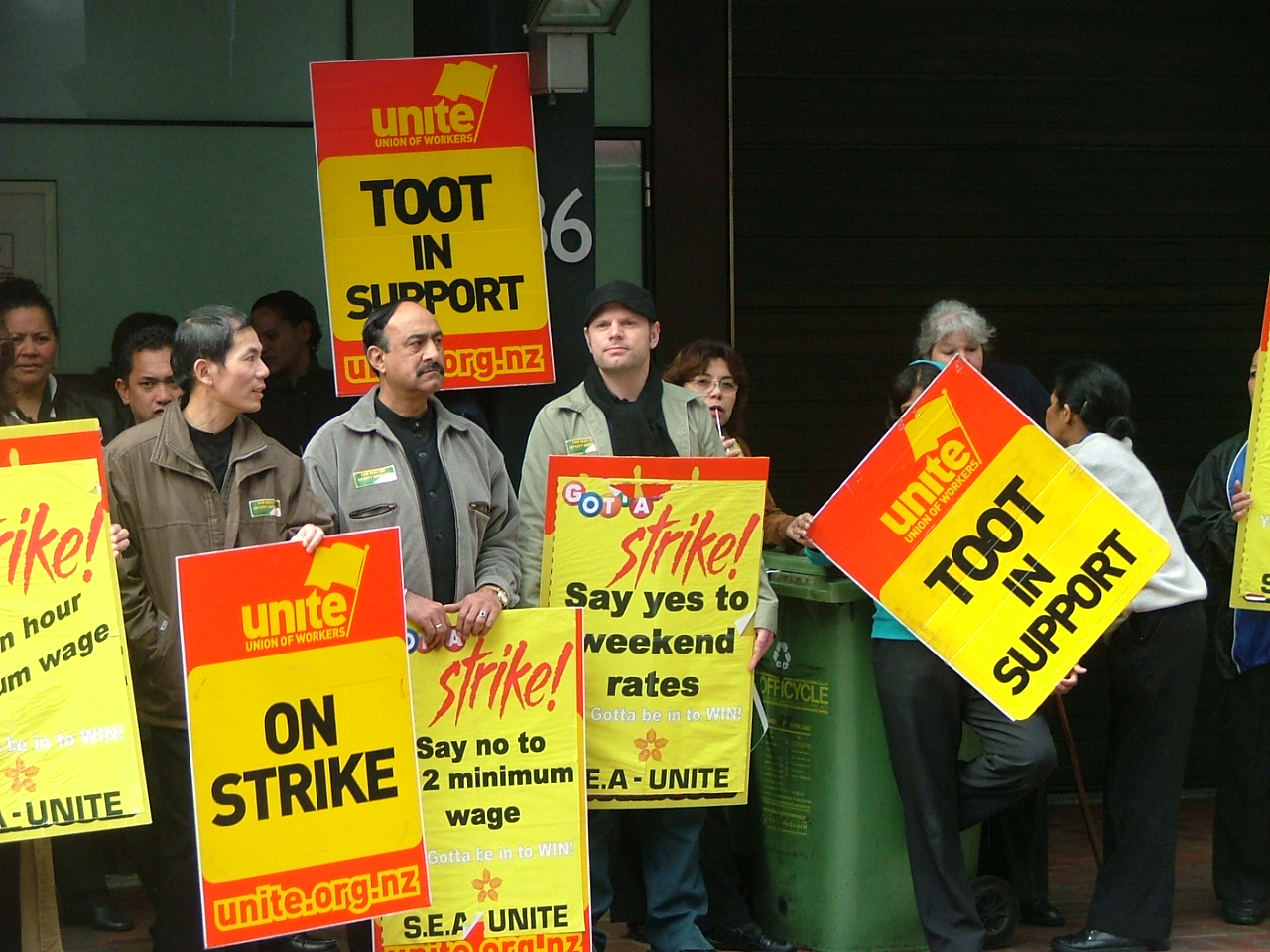
The new legislation (ERA 2000) included a ban on solidarity strikes and political strikes. In summary the legislation, still in place, from a working class point of view, is this, ‘We can only strike for our own contract, only when negotiations have broken down, and if we do engage in an unlawful strike (i.e. a strike for any other reason), there could be severe damages penalties against us and the union’. It is concerning that the left has withdrawn its activism from the issue because, as the comparison goes, this is the new ‘leg-iron of labour’. Continue reading “Reclaiming the right to strike and how it’s essential for rebuilding workers’ power”
ACC changes negative for workers
Byron Clark The Spark December 2009
At the end of October parliament voted 69 to 53 to send the Injury Prevention, Rehabilitation and Compensation Amendment Bill, which contains a number of proposed changes to ACC, to select committee. The National Party initially had trouble getting together the numbers, with ACT insisting the changes didn’t go far enough. Despite some initial concerns however, the Maori Party eventually fell into line, with the bizarre sounding justification, “We know that Maori have consistently had less access to ACC entitlements than other groups, under existing legislation. While this Bill would further restrict entitlements, we are particularly interested in hearing how the scheme may be altered to address the underlying bias to Maori.”
Many of the changes have already been met with strong public protest. New guidelines that would require sexual abuse victims to be diagnosed with a mental illness under the US Diagnostic and Statistical Manual Version 4 before they can receive counselling led to rallies in Auckland, Wellington and Christchurch, each attracting 200 people. A smaller protest also took place in Dunedin. Continue reading “ACC changes negative for workers”
Industrial activity review for 2009
The following article by Mike Kay overviews industrial activity in New Zealand in 2009 and summarises some of the highlights.
Overview
The Statistics NZ Survey of Working Life (March 2008) identified 30.1% of all employees as union members. Female employees were more likely to be union members than males (33.0% and 27.4%, respectively). Only 17.4% of casual employees were unionised. By industry, union membership was highest for those who worked in education (58.5%), health and community services (52.0%) and other services (42.8 %). Professionals (46.1%) and those who worked as plant and machine operators and assemblers in their main job (41.5%) had the highest level of union membership.
There has been a strong downward trend for work stoppages in the recent period, by every measure:
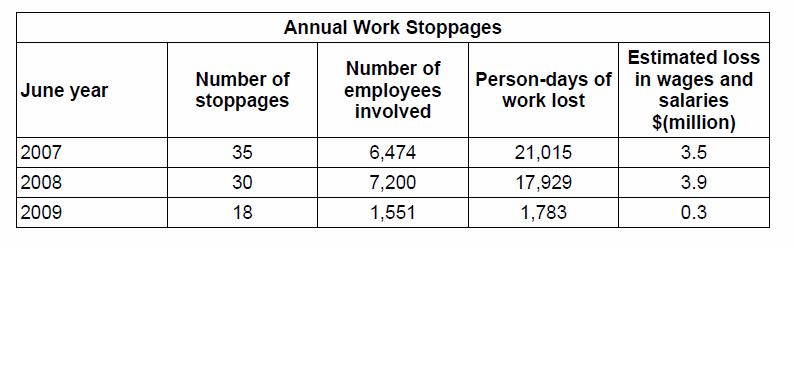 Source: Statistics NZ Work Stoppages: June 2009 quarter
Source: Statistics NZ Work Stoppages: June 2009 quarter
Although the year to June figures excludes a number of recent major disputes towards the end of 2009, they represent the lowest number of stoppages in 18 years. The transport, postal and warehousing industry was responsible for most stoppages, significantly ahead of the next most militant sector, manufacturing. Undeniably, we are still in the midst of a protracted downturn in the class struggle, although some notable exceptions to the trend may point the way to a revival of militancy in the coming year. Continue reading “Industrial activity review for 2009”
Campaigning for living wage reform – ground reports
Unite union has launched a campaign in workplaces and communities for a national referendum on the issue of a $15 minimum wage. In this early stage of the campaign, Workers Party activists and other leftists are hitting the streets and public events to help gather the signatures to force the referendum. Here are some interesting comments, reports, and examples from the campaign on the ground.
Continue reading “Campaigning for living wage reform – ground reports”
Sign the $15 petition
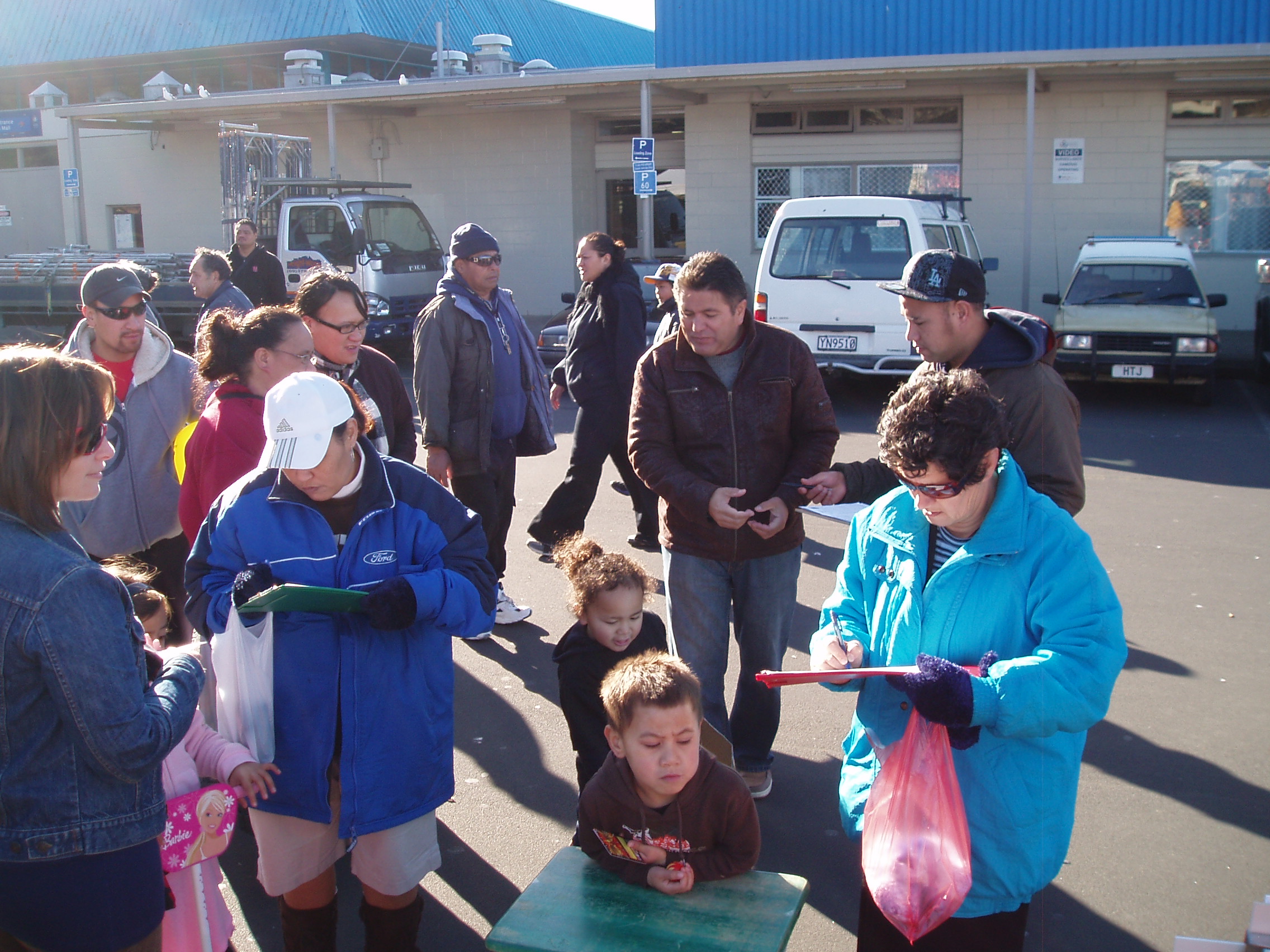 Workers Party activists collected around 100 signatures for Unite’s campaign for a hike in the Minimum Wage at Auckland’s Otara Flea Market today.
Workers Party activists collected around 100 signatures for Unite’s campaign for a hike in the Minimum Wage at Auckland’s Otara Flea Market today.
Many of the signers remarked how they would personally benefit from raising the rate to $15 per hour – which would result in a pay increase for some 450,000 workers in New Zealand. It was an encouraging start to the year-long campaign to get the 300,000 signatures necessary to force a referendum on the issue.
Workers Party activists in Christchurch and Wellington have also been collecting hundreds of signatures at stalls and in workplaces.
